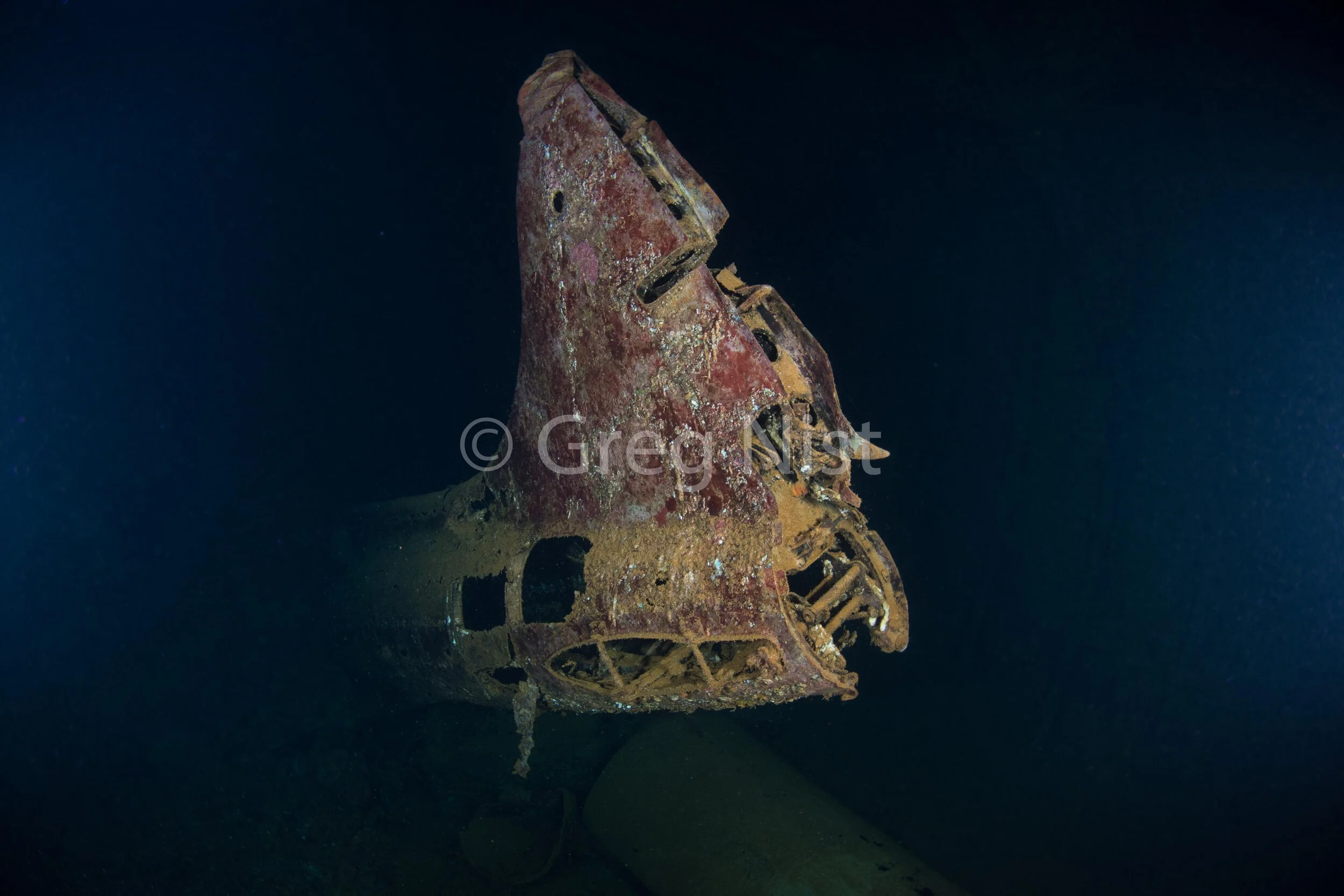![Lionfish on the Deck]()
Lionfish on the DeckThis photo was shot on the deck of the Yamagiri Maru wreck. The lionfish complemented by the soft coral and the blue of the water really make it pop.
![Soft Coral Explosion]()
Soft Coral ExplosionExploring the life on the mast of the Kensho Maru makes for a long slow ascent that is anything but boring.
![Shark Silhouettes]()
Shark SilhouettesWhile most of the diving on Chuuk is spent exploring WWII wrecks, you’re still right in the middle of the bountiful waters of Micronesia! It was a nice diversion to make a trip outside the lagoon to the outer reef for a dive with sharks.
![Anemone and Fish]()
Anemone and FishIn the late afternoon, the anemones living on the ships begin to close up revealing their gorgeous color. It means cramped quarters for the anemone fish that make it their home.
![Battle Tank]()
Battle TankThe San Francisco Maru is one of the premier dives in Chuuk, and the battle tanks found on the deck are a major reason why! This image wasn't easy to capture -- and you can learn more about it in my blog.
![Bombs Away]()
Bombs AwayYou know, just a cargo hold full of 500 pound undetonated bombs that have been sitting in the ocean for decades.
![Follow the Leader]()
Follow the LeaderA pilot fish leads the way. Pilot fish and shark are allies in that the pilot fish helps keep the shark cleaned of parasites, and the shark provides the pilot fish with a security detail.
![War Artifacts]()
War ArtifactsExploring the various holds and rooms of old ships always turns over something fascinating. Here we see some bullets and a gas mask in a cargo hold of the Nippon Maru.
![Medical Table]()
Medical TableThe Shinkoku Maru was equipped with hospital facilities and this is one of the operating rooms complete with operating table and various medical supplies. There are also human bones here, a testament to the realities of the war.
![Medical Kit]()
Medical KitThis medical box found on the Fumitzuki destroyer was curated by the local dive guides and filled with various artifacts including china and glassware.
![Betty Bomber]()
Betty BomberIn WWII, American service members gave female names to enemy bomber aircraft and male nicknames to enemy fighter aircraft.
![Tractor]()
TractorMany of the ships sunk in Truk Lagoon during Operation Hailstone were cargo ships -- this tractor is found in one of the holds on the Hoki Maru.
![Trucks in Truk]()
Trucks in TrukThe Hoki Maru also has a hold filled with old trucks.
![Batfish and Mooring]()
Batfish and MooringThe deep dives in Chuuk mean lots of time in spent at the end of dives in shallower water playing with the batfish. Here the batfish and the mooring made for an interesting composition.
![Beer and Sake]()
Beer and SakeIt almost became comical how much beer and sake you find while diving the wrecks of Chuuk. This hold was particularly interesting because we entered the hold through the blast hole from a torpedo hit, which you can see in this photo.
![Ships Mast]()
Ships MastAfter exploring the dark corners of a ship, its refreshing to make a slow ascent up the brightly colored mast of the Hoki Maru.
![R2D2]()
R2D2Affectionately known by divers as R2D2, this is actually a compressor in the machine shop room of the Fujikawa Maru.
![Clyde Tail]()
Clyde TailThe wreck of the Fujikawa Maru contains some fighter aircraft, nicknamed "Clyde" by US Servicemen, in some of its holds.
![Clyde Cockpit]()
Clyde CockpitThe cockpit of a Japanese fighter plan, nicknamed "Clyde", inside the Fujikawa Maru.
![Ships Telegraph]()
Ships TelegraphThe ships telegraph on the bow of the Fujikawa Maru was used to communicate messages to the sailors working in the engine room below. If you zoom in you can see messages like "Drop Anchor" or "Make Fast" on the telegraph in the image.
![Bow Shot]()
Bow ShotThe bow of the Fujikawa Maru. You can see the bow gun and a diver swimming near it on the right side gives a sense of perspective to just how big this ship (and gun!) really are.
![Bow Gun]()
Bow GunThis is a full color, close up shot of the massive bow gun on the Fujikawa Maru.
![Gauge]()
GaugeThis gauge is in the engine room of the Unkai Maru. You can see the gauge was made by a English company on Duke Street. Some of the Japanese ships in WWII were of English origin, the result of a period of time after WWI when the Japanese and British were allies.
![Water Filter]()
Water FilterThis Japanese water filter can be found in a hold inside the Rio de Janeiro Maru. Maru is a word that literally means "circle" and was indicative of a merchant vessel. Prior to the war, this ship would have run routes between Japan and Rio. During the war, the Japanese military refitted these ships for military use.
![Case of Beer]()
Case of BeerInside the Rio de Janeiro Maru is yet more beer and sake. These bottles are special in that the wooden crates that packaged them are still partially intact.
![Rifles]()
RiflesInside the Rio de Janeiro Maru you can see rifles that have fused into the ship over time.

























